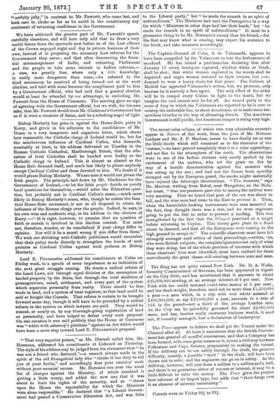The recent solar eclipse, of which two very admirable accounts
appear in Nature of this week, from the pens of Mr. Norman Lockyer and Mr. J. P. Maclear, seems to have finally set at rest the little doubt which still remained as to the character of the 'corona,'—to have proved completely that it is a solar appendage, and not due to the atmosphere of the earth. The observations were in one of the Indian stations very nearly spoiled by the excitement of the natives, who set the grass on fire by way of a hostile demonstration against the monster who was eating up the sun ; and had not the flames been speedily stamped out by the European guard, the smoke might materially have injured the telescopic observations. "The rumours," says Mr. Maclear, writing from Bekul, near Mangalore, on the Mala- bar coast, "that our presence gave rise to among the natives were very amusing. First we heard that part of the sun was about to fall, and the wise men had come to the East to prevent it. Then, when the formidable-looking instruments were seen mounted on the fort, they thought .there was a war, and we were engineers going to put the fort in order to prevent a landing. This was strengthened by the fact that the Glasgow practised at a target before returning to Ceylon. This theory gave place to a flood about to descend, and that all the Europeans were coming to the high ground to escape it." The scientific observers must have felt strangely amongst such critics of their proceedings,—critics,
who were British subjects; the complete ignorance not only of what they were doing, but of the whole province of interests with which these observers' lives were identified, must have realized for them marvellously the great chasm still existing between man and man.


































 Previous page
Previous page